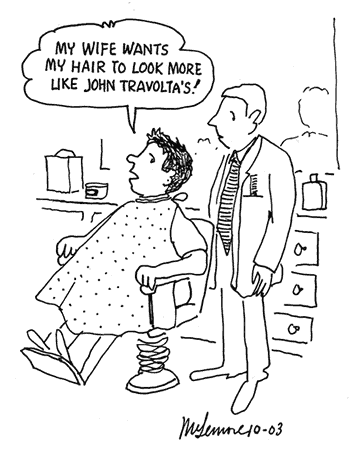|
 HOT ISSUE HOT ISSUE
The Good, Bad and
Ugly of the MAP Commission
By
Andy Brack
SC Statehouse Report
| |
|
FEEDBACK
POLICY
We encourage
your feedback. If you'd like to respond to something in SC
Statehouse Report, please send us an e-mail. We reserve
the right to edit for length and clarity. One submission allowed
per month. Please keep your comment to 250 words or less:
|
OCT.
5, 2003 - - In the just-released 198-page report on state government
management, accountability and performance, there's a hodge-podge
of 213 recommendations for change - - many good, some bad and a
few ugly.
In general, the 14 commissioners on the panel appointed by Gov.
Mark Sanford do a pretty good job of recommending ways for the state
to decrease duplication, boost efficiencies and improve accountability
for taxpayers. They claim if all of the recommendations are implemented
by executive order or by legislative approval, the state could save
$2.2 billion over five years.
But in a state where power is in the General Assembly, it's highly
unlikely the state will achieve those whopping savings. Remember,
Gov. Sanford's accountability report is the 15th report over the
last 80 years that has called for less fractured, less duplicative
government.
One of the most significant aspects of the report is its emphasis
on creating government clusters of service for functions that occur
throughout government. Why, commissioners wonder, should each agency
have separate groups to deal with planning, budgeting, human resources,
information technology, administrative functions and the like? It
would be smarter, they say, for common areas of government, such
as Mental Health, Health and Human Services, Health and Environmental
Control, Social Services and more, to be clustered administratively
under a single health and human services agency. Each department
would remain separate; each, however, would use common services
from the central agency.
Other good ideas in the report include recommendations to privatize
the state's school bus fleet, centralize vehicle maintenance functions,
better managing the state's vehicles, use technology to deliver
more and better services to taxpayers, and establish a central building
authority to manage the state's property. It's also a good idea
to try to figure out a way for the 74 different accounting systems
used by various agencies to be able to be integrated to reduce redundancy.
But there are other parts of the report that are unsettling.
The most notable was an exception involving state employees. MAP
Commission Chairman Ken Wingate went out of his way Tuesday when
he unveiled the report to praise the state's 60,000+ hard-working
employees.
But with $2.2 billion of cost-cutting and savings recommendations,
Wingate was mum on how many state employees would lose their jobs
if the MAP Commission's recommendations were implemented. He simply
noted that 31 percent of the state-paid work force was eligible
for retirement within five years and the problem would "take
care of itself." What does that mean? There doesn't appear
to have been any policy discussion about the ramifications of potentially
20,000 fewer state employees.
The commission also recommended making two statewide offices -
- the superintendent of education and adjutant general - - become
appointed offices. It also recommended the secretary of state's
functions to be consolidated into the Department of Revenue. While
the Legislature is considering some restructuring of constitutional
offices, it seems like a bad idea to reduce freedoms and cut accountability
by taking away people's votes.
Finally, the report includes some things state lawmakers might
find plain ugly. Viewed broadly, the report suggests a huge power-grab
by the governor's office. All of the consolidation and shifting
around of agencies would have the impact of making South Carolina's
governor much more powerful and, conversely, the General Assembly
weaker. Making agencies accountable to the governor might seem like
good business on paper, but it doesn't take politics into account.
As some lawmakers already have suggested, the General Assembly isn't
likely to reduce its influence.
There's also a concern the shifting around of agency responsibilities
is nothing more than moving shells in a shell game - - that all
of the consolidations may not have much of a real impact on the
way people use government and are, instead, bureaucratic maneuverings
designed to make it look like change is happening when it really
isn't.
Regardless, the MAP Commission report has a lot of good ideas.
We'll see where the rubber hits the road in January when the Legislature
takes a whack at the commission's recommendations.
 McLEMORE'S WORLD McLEMORE'S WORLD
Night fever?
This week's cartoon by our Bill McLemore:

###
|





